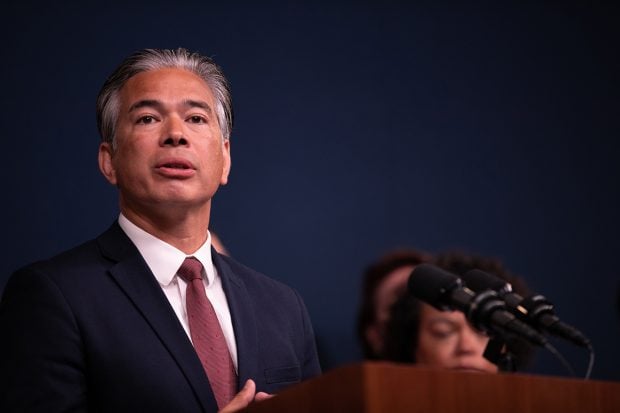 California Attorney General Rob Bonta. Credit/California Department of Justice
California Attorney General Rob Bonta. Credit/California Department of JusticeHours After Trump Takes Office, Democratic AGs Target Birthright Citizenship Order
Twenty-two states, the District of Columbia and San Francisco will seek a preliminary injunction blocking a Trump order denying citizenship to U.S.-born children of unauthorized immigrants.
January 21, 2025 at 05:00 PM
4 minute read
Attorneys general from 22 states and the District of Columbia sued President Donald Trump on Tuesday, just hours after he issued an executive order aimed at denying citizenship to U.S.-born children of unauthorized immigrants.
The first suit, filed in Massachusetts federal court, alleges that the order "unambiguously" violates the Fourteenth Amendment and infringes on congressional powers. At a news conference in San Francisco, California Attorney General Rob Bonta said the state plaintiffs hope to obtain a preliminary injunction blocking the order before it takes effect Feb. 19.
"The president has overstepped his authority by a mile, and we will hold him accountable," Bonta said.
California, Massachusetts and New Jersey will take the lead on the suit, Bonta and a spokesperson for Massachusetts Attorney General Andrea Joy Campbell said.
Joining those states in the lawsuit are Colorado, Connecticut, Delaware, Hawaii, Maine, Maryland, Michigan, Minnesota, Nevada, New Mexico, New York, North Carolina, Rhode Island, Vermont, the District of Columbia and San Francisco.
Another, separate suit attacking Trump's order was also filed Tuesday in the U.S. District Court for the Western District of Washington by attorneys general for Washington, Arizona, Illinois and Oregon.
"We have very particular interests here in Washington," Attorney General Nick Brown told reporters at a press conference. "There are specific and unique harms that are brought here and we thought it was appropriate to lead a case here."
The complaints are expected to be one of many filed by Democratic attorneys general and legal groups in the coming weeks after Trump signed dozens of executive orders in his first hours as president Monday. Many of the president's directives overturned previous orders by President Joe Biden and targeted issues championed by Democrats, including energy efficiency regulations, tailpipe emissions restrictions and transgender rights.
"States are on the front lines of defending our rights and defending our residents," New Jersey Attorney General Matthew Platkin said in a press event Tuesday. "And they will lead this fight for birthright citizenship."
Immigrants' rights groups, represented by the American Civil Liberties Union, were the first to sue Trump over his citizenship executive order, filing a complaint Monday in New Hampshire federal court. Bonta said Tuesday that the plaintiff states were aware of the groups' litigation plans but are choosing to proceed separately.
Both cases are filed within the jurisdiction of the U.S. Court of Appeals for the First Circuit, where every active judge was appointed by a Democrat. Asked about the decision to file the attorneys general's suit in Massachusetts and not in California, Bonta said Tuesday only that "it made sense for this case."
Democratic and Republican presidential administrations have long recognized birthright citizenship as inherent in the first clause of the Fourteenth Amendment: "All persons born or naturalized in the United States, and subject to the jurisdiction thereof, are citizens of the United States and of the State wherein they reside."
The U.S. Supreme Court affirmed that reading in the 1898 decision in United States v. Wong Kim Ark, which held that the San Francisco-born son of Chinese immigrants was a U.S. citizen. Almost 100 years later, the nation's high court in Plyler v. Doe also held that residents in the country without authorization are subject to U.S. jurisdiction under the Fourteenth Amendment.
Courts and most legal scholars have consistently recognized Wong Kim Ark as valid precedent, said Hiroshi Motomura, a UCLA School of Law professor who teaches and writes about immigration and citizenship. One academic outlier has been former Chapman University law school dean John Eastman, who has argued that Wong Kim Ark has been too broadly interpreted for a century to impinge on Congress' power to determine who is a U.S. citizen.
Eastman had Trump's ear in the waning days of his last administration when he told Trump that then-Vice President Mike Pence had the authority to halt the Electoral College count that would make Biden president. That counsel led to Eastman's disbarment in California last year.
Motomura would not predict whether the current Supreme Court, which has already disavowed landmark precedents such as Roe v. Wade and the Chevron doctrine, would continue to follow the Wong Kim Ark holding.
"This would be a far more fundamental overruling," Motomura said. "It would turn its back on something very important that emerged from the Civil War, which is that it's essential to the constitutional makeup of this country not to have a group of second-class residents."
This story was updated on 1/21/2025 at 2:45 p.m. PST to add information about a birthright citizenship suit filed separately by attorneys general for Washington, Arizona, Illinois and Oregon.
NOT FOR REPRINT
© 2025 ALM Global, LLC, All Rights Reserved. Request academic re-use from www.copyright.com. All other uses, submit a request to [email protected]. For more information visit Asset & Logo Licensing.
You Might Like
View All
Supreme Court Upholds Law Requiring TikTok's Divestiture or Shutdown

Assessing the Second Trump Presidency’s Impact on College Sports

Willkie Farr & Gallagher Drives Legal Challenge for Uber Against State's Rideshare Laws
5 minute read
Supreme Indifference? Justices Unfazed By TikTok’s Time Crunch
Trending Stories
- 1How Law Firms Can Make Business Services a Performance Champion
- 2'Digital Mindset': Hogan Lovells' New Global Managing Partner for Digitalization
- 3Silk Road Founder Ross Ulbricht Has New York Sentence Pardoned by Trump
- 4Settlement Allows Spouses of U.S. Citizens to Reopen Removal Proceedings
- 5CFPB Resolves Flurry of Enforcement Actions in Biden's Final Week
Who Got The Work
J. Brugh Lower of Gibbons has entered an appearance for industrial equipment supplier Devco Corporation in a pending trademark infringement lawsuit. The suit, accusing the defendant of selling knock-off Graco products, was filed Dec. 18 in New Jersey District Court by Rivkin Radler on behalf of Graco Inc. and Graco Minnesota. The case, assigned to U.S. District Judge Zahid N. Quraishi, is 3:24-cv-11294, Graco Inc. et al v. Devco Corporation.
Who Got The Work
Rebecca Maller-Stein and Kent A. Yalowitz of Arnold & Porter Kaye Scholer have entered their appearances for Hanaco Venture Capital and its executives, Lior Prosor and David Frankel, in a pending securities lawsuit. The action, filed on Dec. 24 in New York Southern District Court by Zell, Aron & Co. on behalf of Goldeneye Advisors, accuses the defendants of negligently and fraudulently managing the plaintiff's $1 million investment. The case, assigned to U.S. District Judge Vernon S. Broderick, is 1:24-cv-09918, Goldeneye Advisors, LLC v. Hanaco Venture Capital, Ltd. et al.
Who Got The Work
Attorneys from A&O Shearman has stepped in as defense counsel for Toronto-Dominion Bank and other defendants in a pending securities class action. The suit, filed Dec. 11 in New York Southern District Court by Bleichmar Fonti & Auld, accuses the defendants of concealing the bank's 'pervasive' deficiencies in regards to its compliance with the Bank Secrecy Act and the quality of its anti-money laundering controls. The case, assigned to U.S. District Judge Arun Subramanian, is 1:24-cv-09445, Gonzalez v. The Toronto-Dominion Bank et al.
Who Got The Work
Crown Castle International, a Pennsylvania company providing shared communications infrastructure, has turned to Luke D. Wolf of Gordon Rees Scully Mansukhani to fend off a pending breach-of-contract lawsuit. The court action, filed Nov. 25 in Michigan Eastern District Court by Hooper Hathaway PC on behalf of The Town Residences LLC, accuses Crown Castle of failing to transfer approximately $30,000 in utility payments from T-Mobile in breach of a roof-top lease and assignment agreement. The case, assigned to U.S. District Judge Susan K. Declercq, is 2:24-cv-13131, The Town Residences LLC v. T-Mobile US, Inc. et al.
Who Got The Work
Wilfred P. Coronato and Daniel M. Schwartz of McCarter & English have stepped in as defense counsel to Electrolux Home Products Inc. in a pending product liability lawsuit. The court action, filed Nov. 26 in New York Eastern District Court by Poulos Lopiccolo PC and Nagel Rice LLP on behalf of David Stern, alleges that the defendant's refrigerators’ drawers and shelving repeatedly break and fall apart within months after purchase. The case, assigned to U.S. District Judge Joan M. Azrack, is 2:24-cv-08204, Stern v. Electrolux Home Products, Inc.
Featured Firms
Law Offices of Gary Martin Hays & Associates, P.C.
(470) 294-1674
Law Offices of Mark E. Salomone
(857) 444-6468
Smith & Hassler
(713) 739-1250






